This guide explains how to set the default apps on Windows 11 to open various file types, documents and links. Microsoft has made a number of improvements that help you update the options for associated programs. Such changes mostly apply to a specific user account, while some of them can be set globally for everyone using your PC.
Advertisеment
In Windows, default apps refer to the programs automatically used to open specific file types or handle certain protocols. It can be a web link, a text file, a PDF document, and so on. So when you double-click a file, the correct application launches to open it. File associations are the connections between file extensions (e.g., .txt, .jpg) and the apps designated to open them. Users can customize these defaults system-wide or on a per-file-type basis.
Let's see how you can configure your default apps on Windows 11.
Change Default Apps in Windows 11
As you could already guess, there are various methods to set the default apps. We will review all of them, and will start with the context menu option.
Assign a Default App via the "Open with" Menu
To configure a default application for a specific file type using the context menu, follow these steps.
- Right-click any file of the type you wish to modify. From the context menu, select Open with.
- If the file type does not currently have an associated default app, only the Open with option will be available.
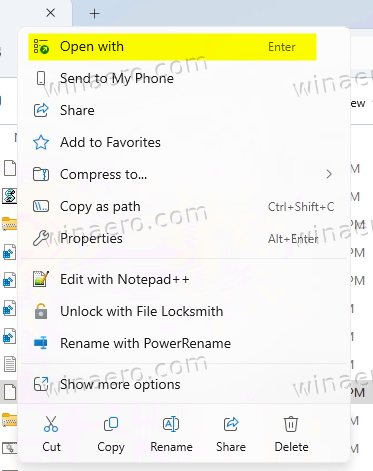
- Click on one of the listed applications to temporarily open the file using that program.
- Alternatively, choose Choose another app to proceed with assigning a new default application.
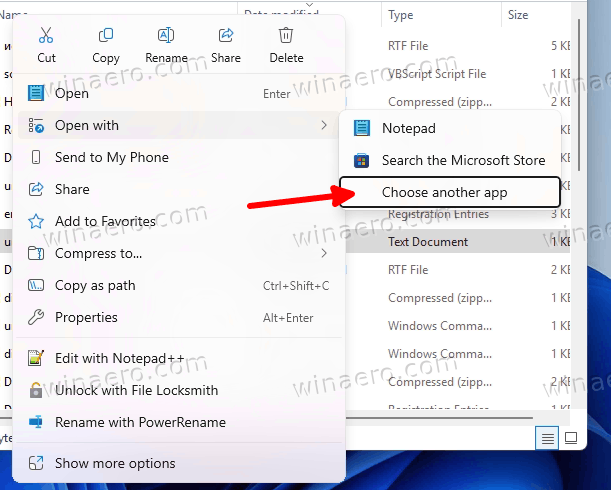
- In the window that appears, you may:
- Select an existing application from the list and choose either Always (to set it as default) or Just once (to use it for this instance only).
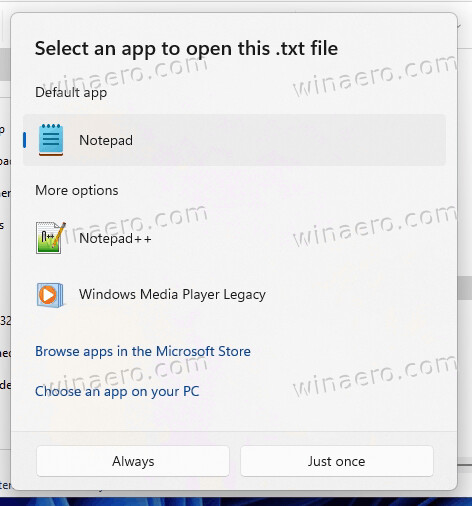
- Click Browse apps in the Microsoft Store to locate and install a compatible application. After installation, return to the previous step to complete the selection.
- Click Choose an app on your PC, navigate to the desired executable file (
.exe,.com,.bat, or.cmd), and confirm your selection. You may then choose to always use this application or just once.
- Select an existing application from the list and choose either Always (to set it as default) or Just once (to use it for this instance only).
- The selected application will now open the file immediately, and if specified, will become the default handler for that file type.
Another method involves modifying the file's properties to change its default application.
Set a Default Application Using File Properties
To change a default app in Windows 11 from the File Properties dialog, do the following.
- Right-click a file and select Properties from the context menu.
- Navigate to the General tab within the Properties window.
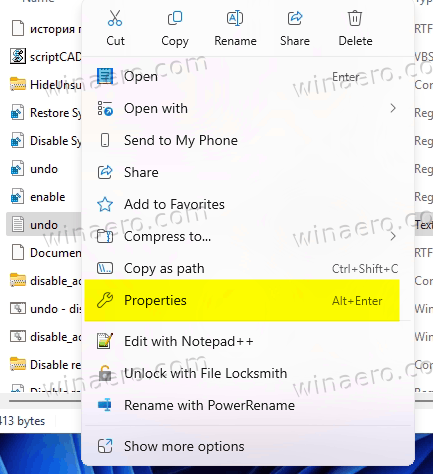
- Locate the section labeled Opens with and click the Change button next to it. If a default application is already assigned, it will appear under the Default app section.
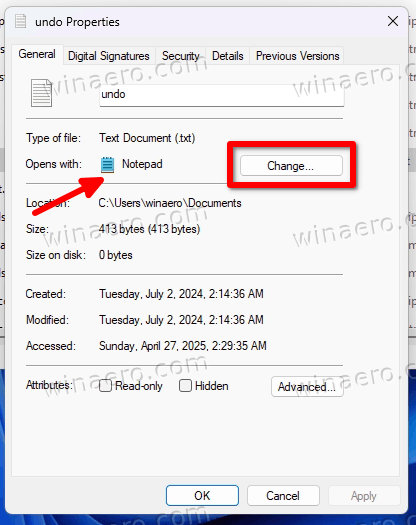
- Choose from the list of available applications and confirm by clicking Set default to make it the primary handler for that file type.
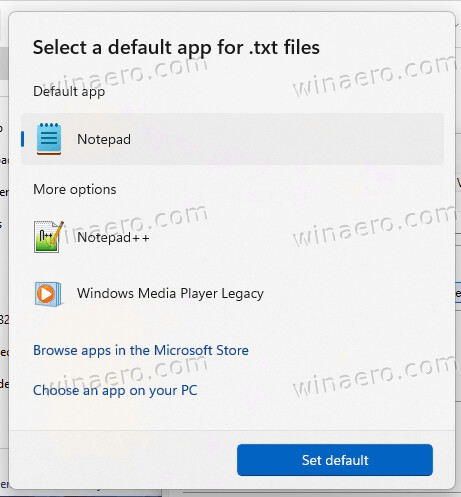
- To explore additional options:
- Click Browse apps in the Microsoft Store to download and install a suitable application. Once installed, repeat the process to assign it as the default.
- Click the Choose an app on your PC link and locate the desired executable file. After selecting the file, click Open, followed by Set default to finalize the assignment.
- Upon completion, the system will update the file association accordingly.
Also, users may also manage file associations through the Settings app, grouped by application.
Configure Defaults by Application in Settings
To set default apps in the Settings app, follow these steps.
- Launch the Settings application by pressing
Win + I. - On the left-hand navigation panel, click Apps. On the right side of the screen, select Default apps.💡You can go directly to this page by entering
ms-settings:defaultappsinto the Win + R Run dialog.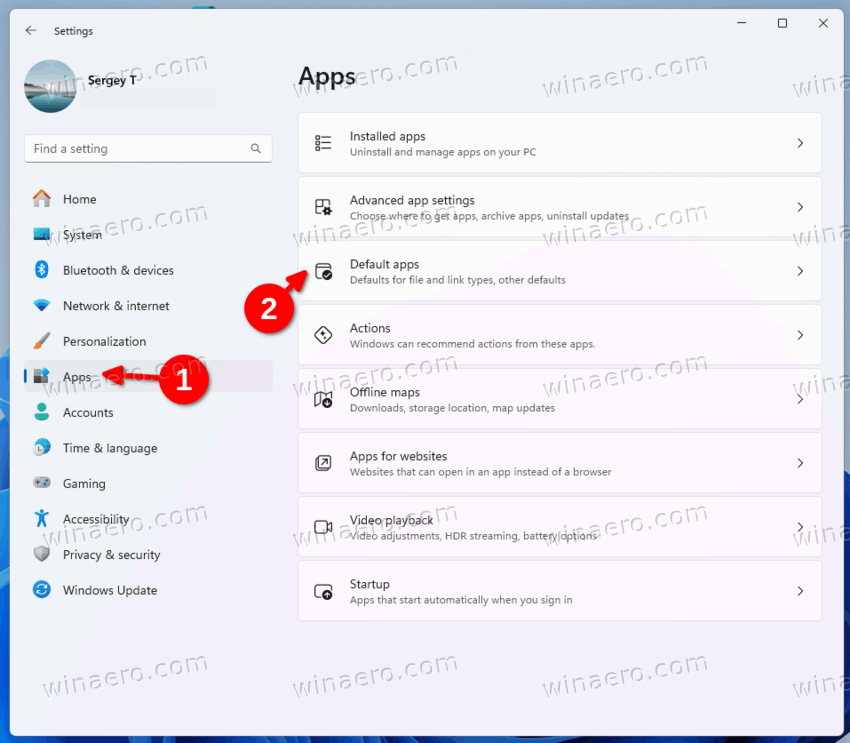
- Use the search bar or scroll through the list to locate the application for which you intend to configure defaults. Click on the name of the application to proceed.
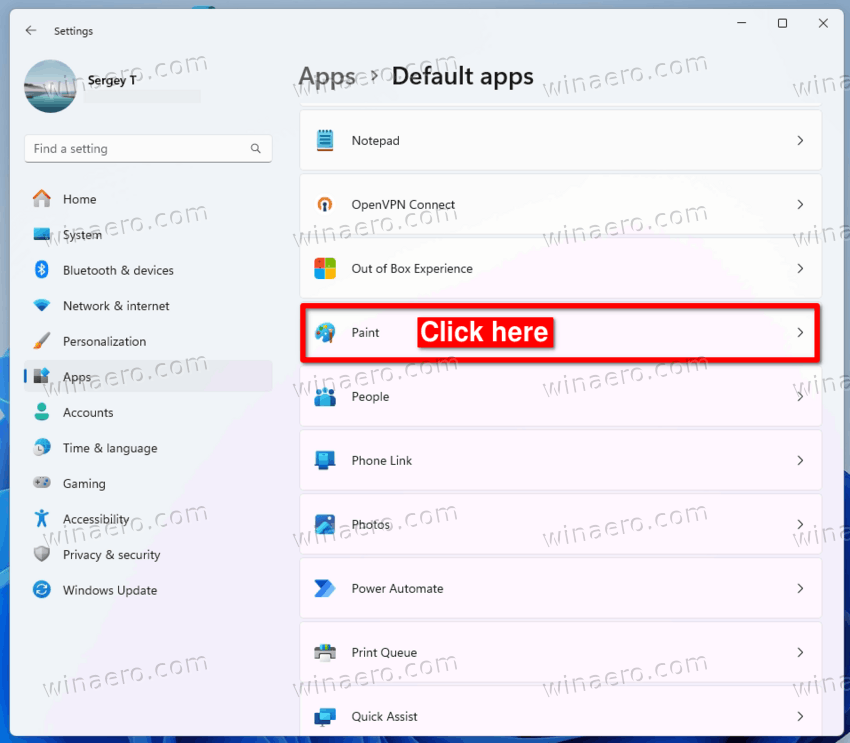
- A list of supported file and link types will appear. Click on the extension or protocol (e.g.,
.bmp) you wish to associate with this application.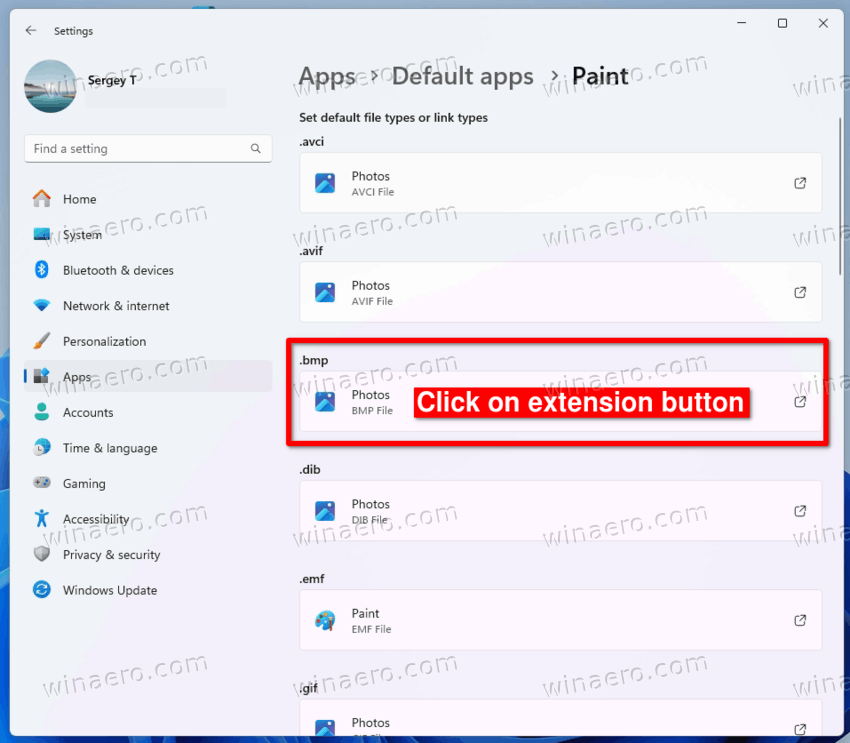
- For the selected file or link type:
- Choose an alternative application from the provided list and click Set default to assign it permanently.
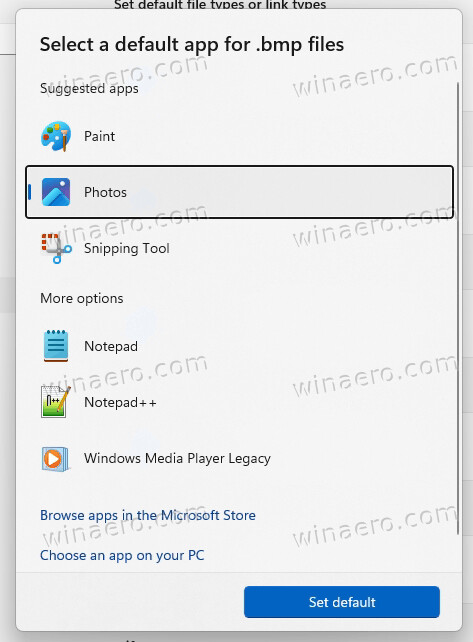
- Install a new application from the Microsoft Store by selecting Browse apps and completing the installation before returning to this step.
- Use the Choose an app on your PC option to locate and assign a local executable file as the default handler.
- Choose an alternative application from the provided list and click Set default to assign it permanently.
- Once you make all desired changes, you can then safely close the Settings window.
Define Default Apps by File Type
File-type-specific defaults can be adjusted directly through the Settings interface.
- Open the Settings application by pressing
Win + I. - Navigate to Apps on the left sidebar and click Default apps on the right side of the window.
- Scroll down and click Choose defaults by file type at the bottom of the right pane.
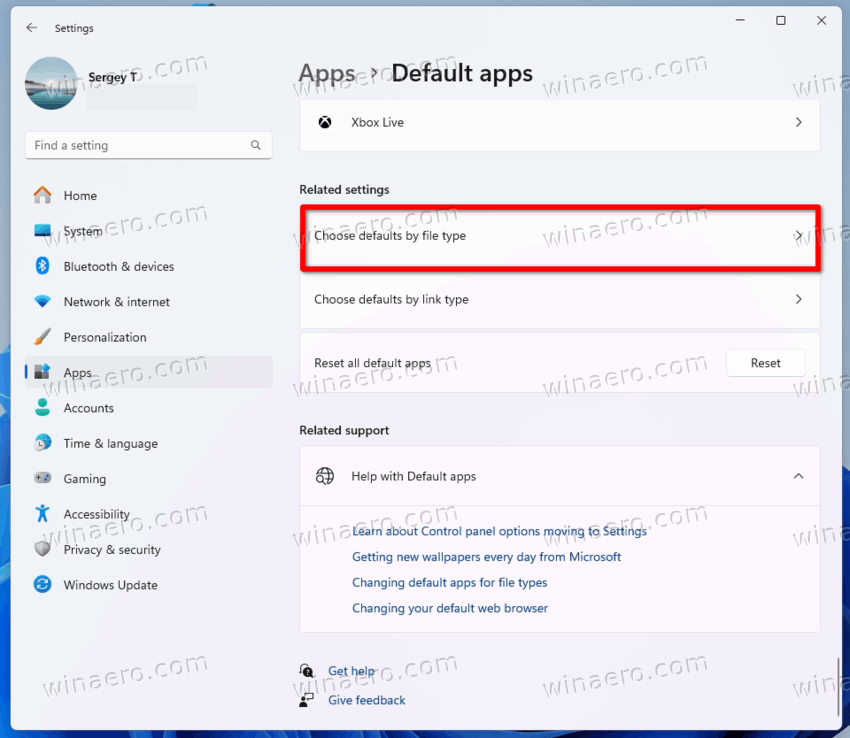
- Use the search field or scroll through the list to locate the file type (e.g.,
.bmp). Click on the file extension to access its settings.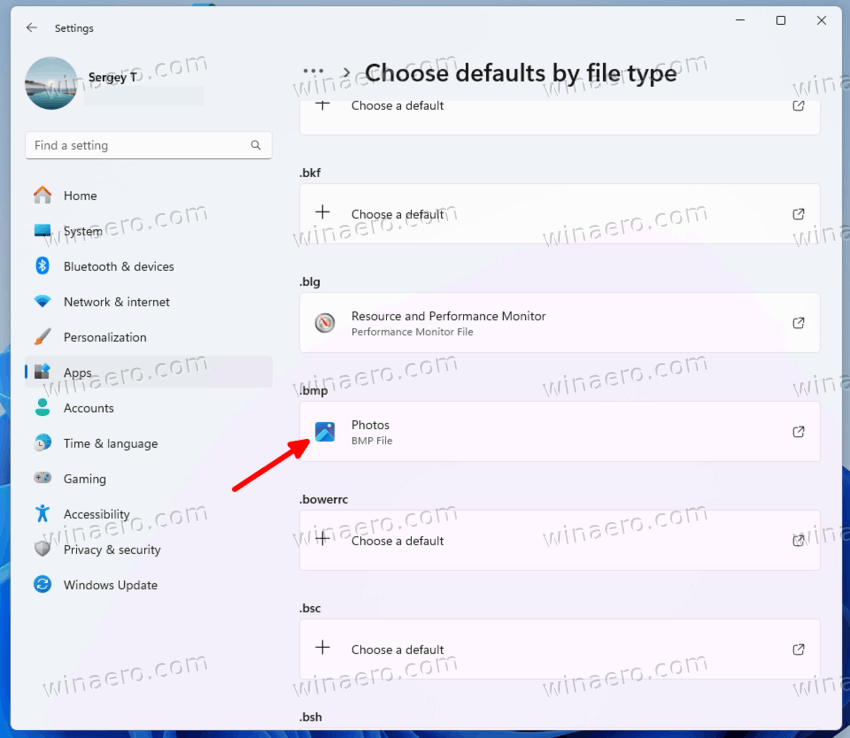
- The current default application will be displayed beneath the file type entry.
- To change the association:
- Select an application from the list and click Set default to confirm the change.
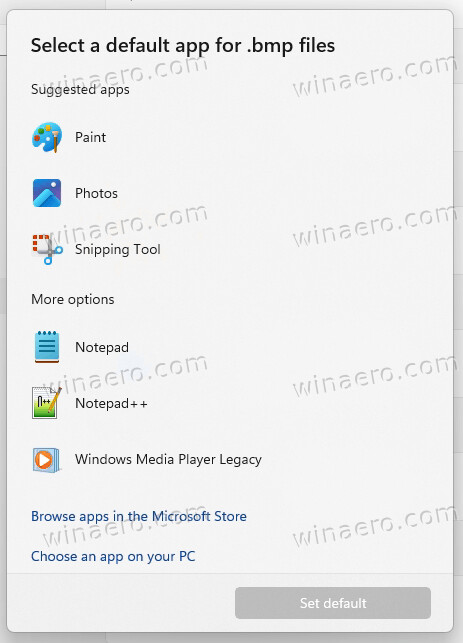
- Download an app from the Microsoft Store by choosing Browse apps and completing the installation. Return to this step afterward to assign it.
- Click Choose an app on your PC to manually select an installed application.
- Select an application from the list and click Set default to confirm the change.
- After making selections, you can close the Settings window.
Windows allows users to define default applications for handling various link types, such as email links or custom protocols.
Configure Default Apps by Link Type
To set default apps in Windows 11 by the protocol link, follow the steps below.
- Launch the Settings application using the keyboard shortcut
Win + I. - On the left side of the window, click Apps. On the right, select Default apps.
- At the bottom of the right-hand panel, click Choose defaults by link type.
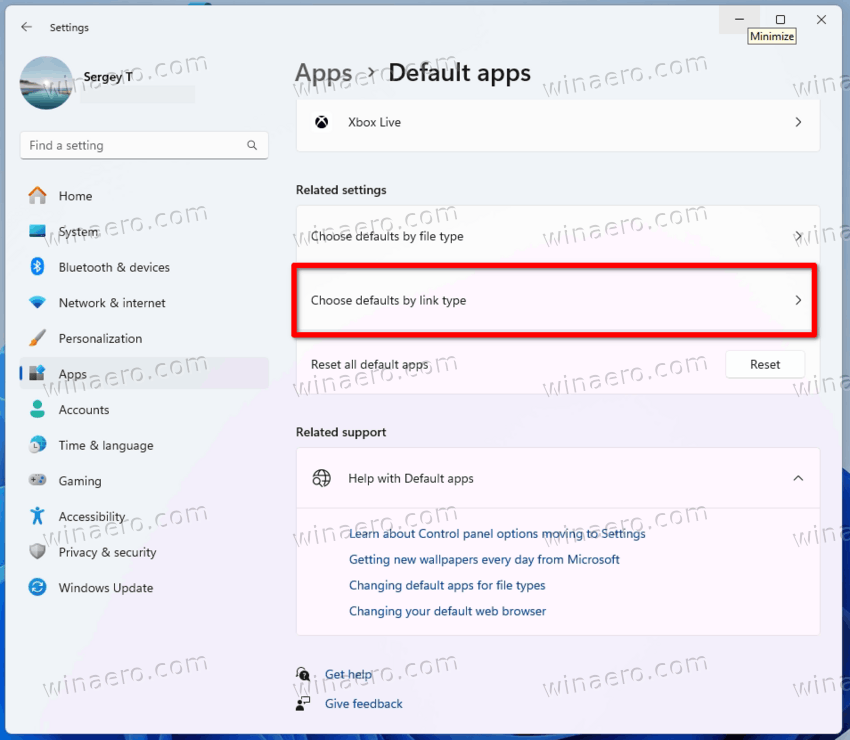
- Locate the desired link type (e.g.,
FTP) and click on it to view current and available handlers. The currently assigned application will be displayed alongside the link type.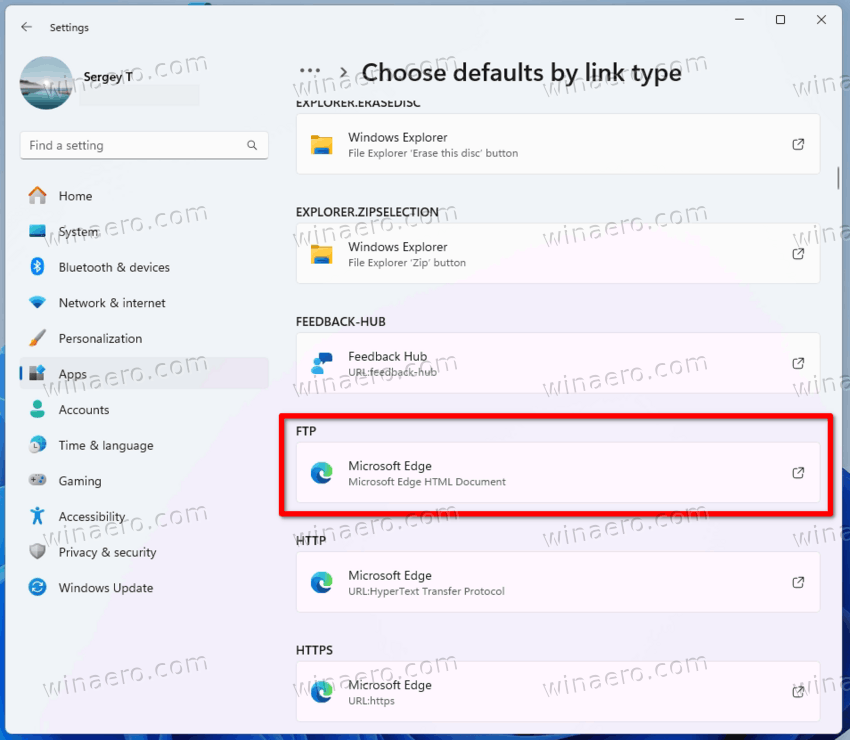
- To change the default:
- Choose from the available applications and click Set default.
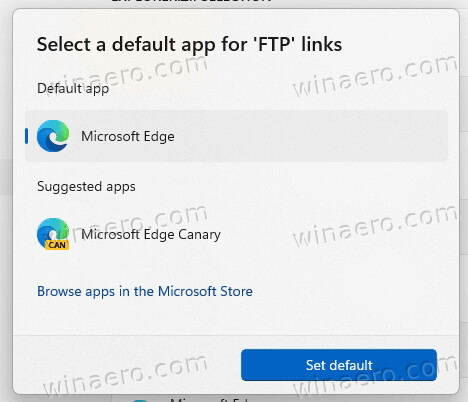
- Select Browse apps in the Microsoft Store to find and install a compatible application. Upon installation, return to this step to assign it.
- Choose from the available applications and click Set default.
- Once adjustments are complete, you can exit the Settings app.
Finally, Windows 11 comes with a dedicated option to set the default web browser. Here's how.
Change the Default Web Browser
This method applies to systems running Windows 11 build 22509 or 22000.593 and later.
- Open the Settings application using the
Win + Ishortcut. - In the left-side navigation menu, click Apps. On the right, select Default apps.
- Locate the web browser you wish to designate as default (e.g., Google Chrome, Mozilla Firefox, Microsoft Edge) and click its name.
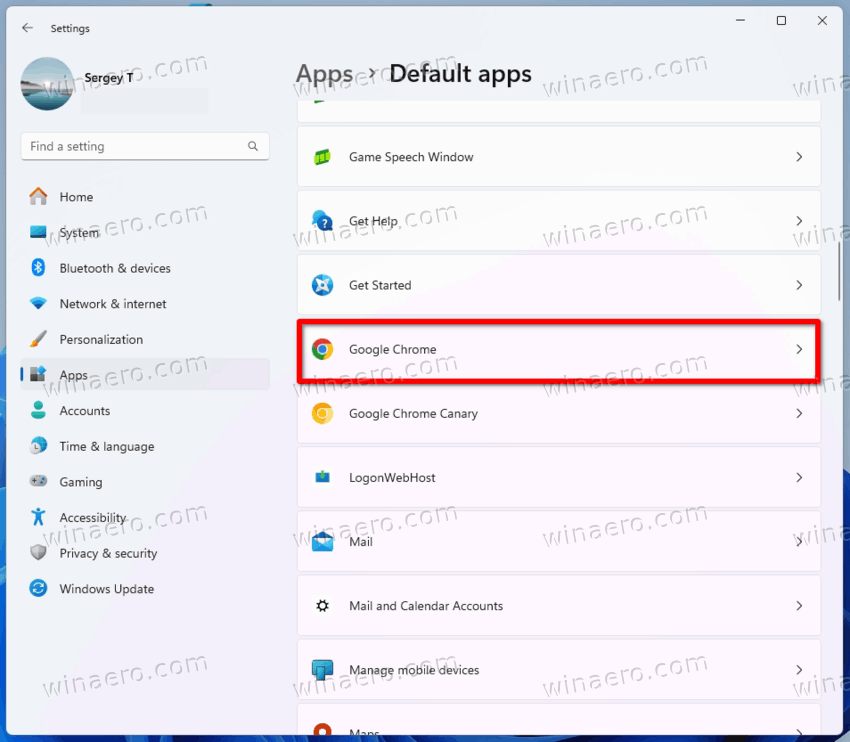
- At the top of the screen, click the Set default button.
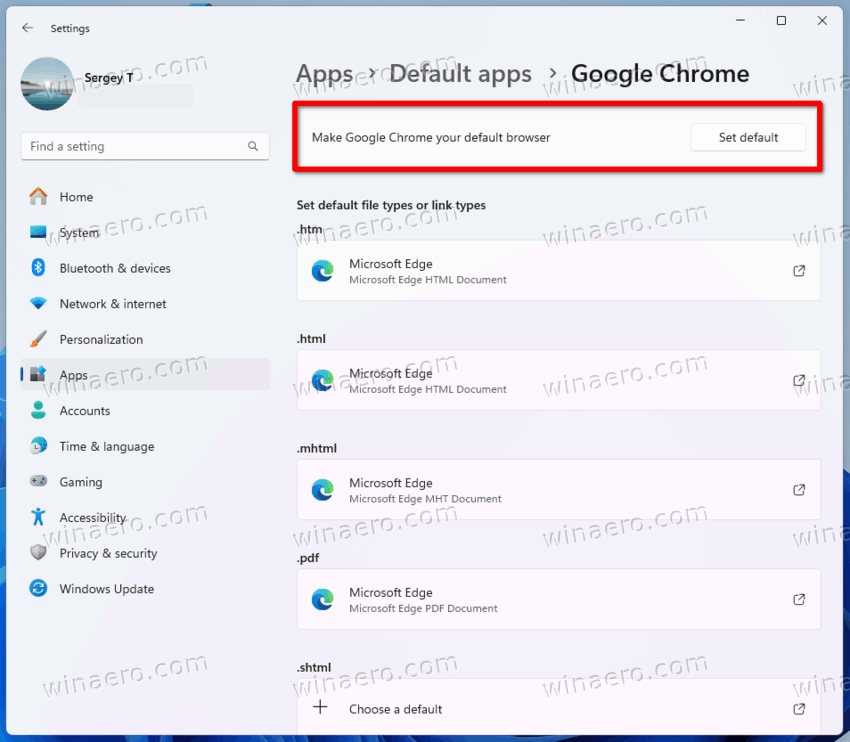
- A confirmation checkmark will appear, indicating the successful assignment.

- Close the Settings application if you are not going to do any further configuration. This action updates the system-wide default browser setting for the current user account.
That's it!
A brief history of improvements
Microsoft is actively working on making the user experience better in various aspects of OS configuration. One of the key enhancements involves the updated "Open with" dialog box. It was first introduced in build 22567, and it is not only allows you to to set default applications with a single click, but also follows system's light and dark themes.
Moreover, starting in Windows 11 build 23419, Microsoft expanded its support for deep linking within the Settings app. It was done via an extended URI scheme (ms-settings:) that enables applications to take users straight to the relevant section of the Settings app for changing default app settings.
Finally, the most recent updates OS include refinements to how file and link types are associated with default apps:
- Users can now assign more file and link types as default using an expanded list under Settings > Apps > Default apps .
- A new one-click option enables users to simultaneously set their default browser and apply it as the default application for opening PDF files , reducing the number of steps required to configure commonly used associations.
- Additionally, in builds 26120.4162 and 26200.5622 , Microsoft is testing the integration of Microsoft Store recommendations directly within the "Open with…" dialog. Applications from the Store are marked with a dedicated icon, helping users discover trusted apps that may be better suited for specific file types.
Support us
Winaero greatly relies on your support. You can help the site keep bringing you interesting and useful content and software by using these options:

I still hate it that we have to change this one file type at a time. Old control panel allowed us to associate it with every file type with one click… Now that’s exclusive to Browsers only.